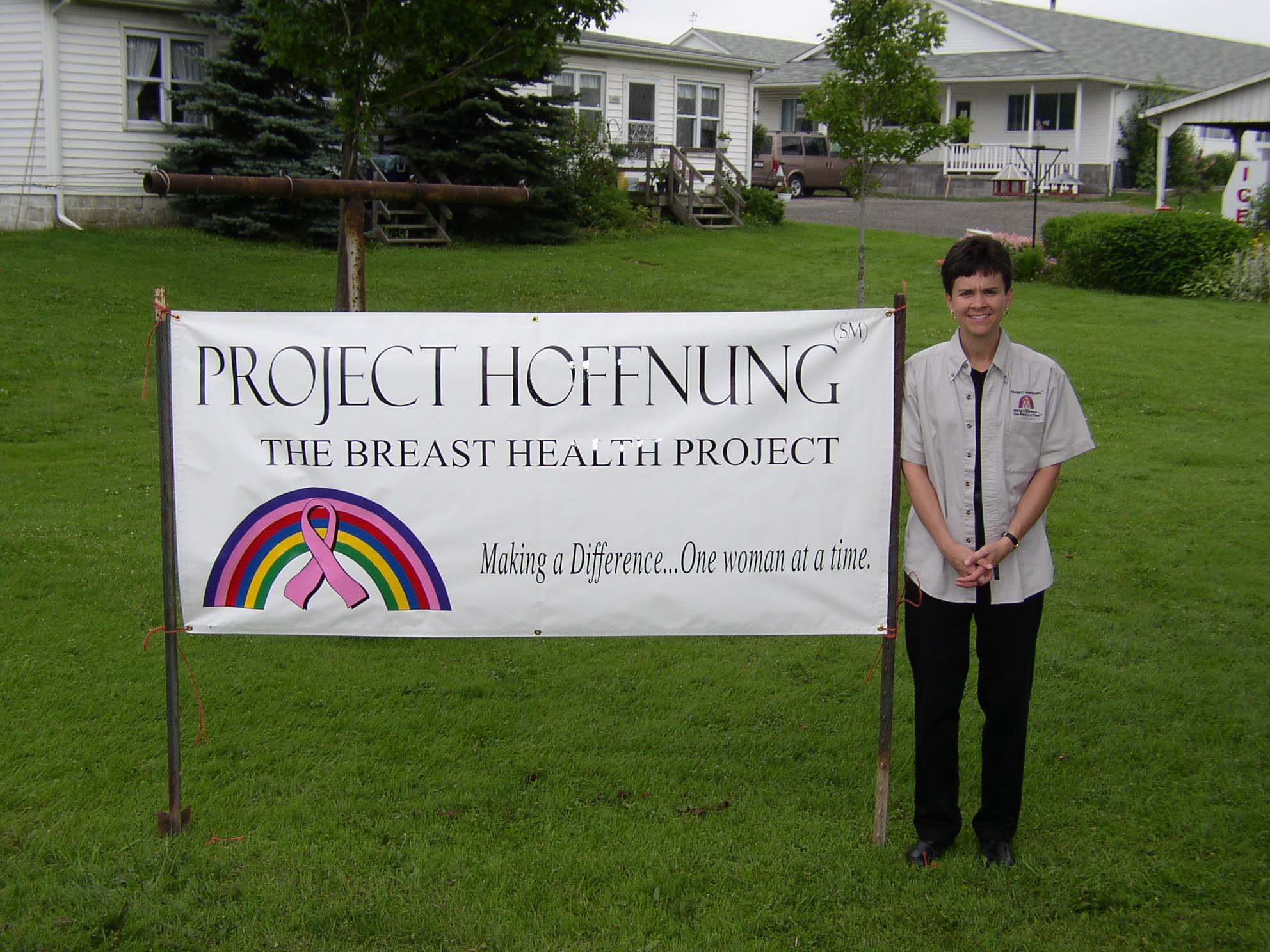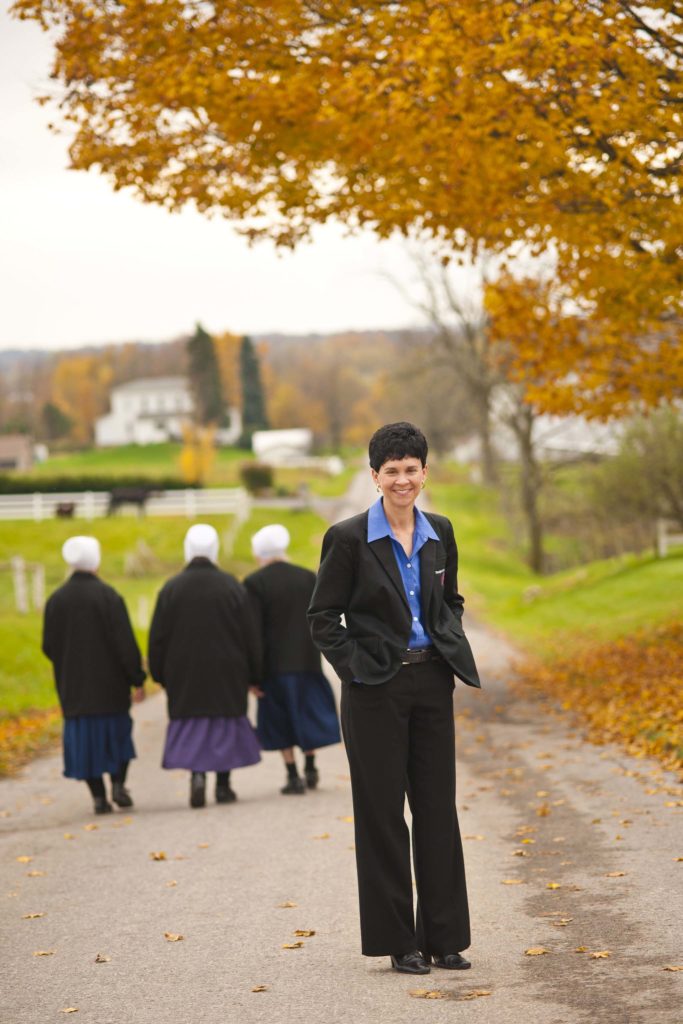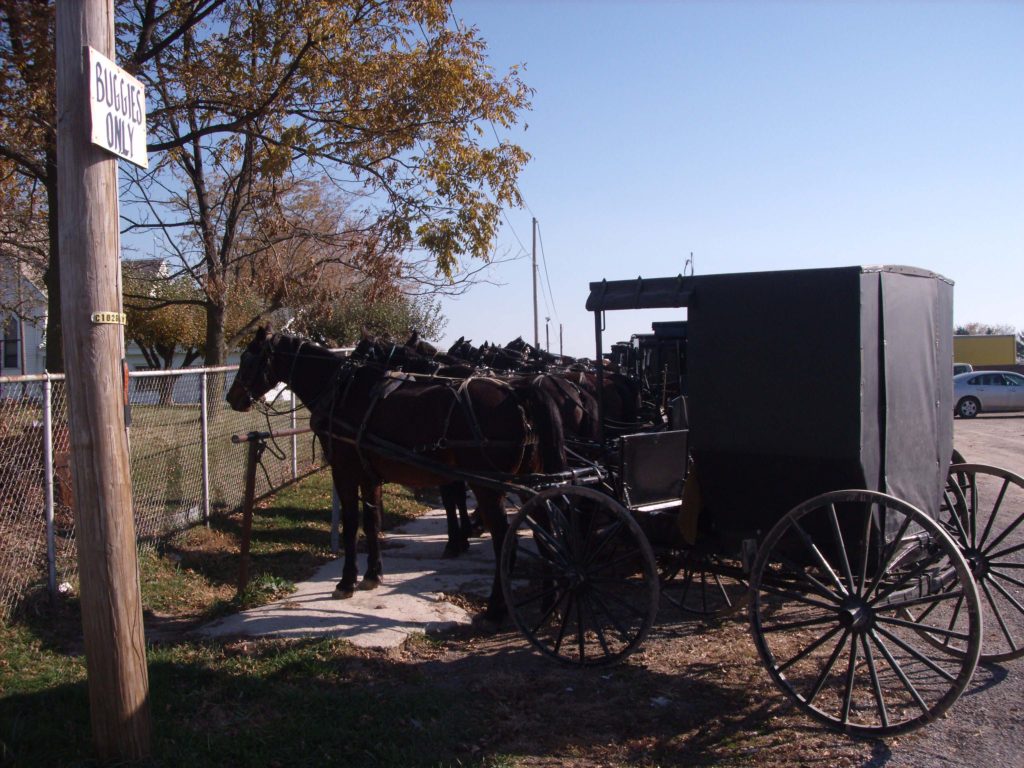
Dr. Melissa Thomas, who created Project HOFFNUNG, stands with the non-profit’s sign. (Photo by: David P). Thomas, Sr.)
For Dr. Melissa Thomas, the fight against cancer hits home
As a child, Dr. Melissa Thomas’ favorite pastime was going to her grandparents’ house. She created games to play with her sister, like tying yarn to clothespins and throwing it up at the limbs of a strong maple tree. Her grandmother encouraged her curiosity, especially her interest in science.
Melissa’s grandmother died when she was 14. She struggled to find the “why” behind the loss of her hero — who died of a cancer that could have been prevented through education and access to healthcare.
“It was a devastating loss to lose her,” she says. “That was a moment in my life that stuck with me and that I needed to make some reason out of her death. I didn’t want her death to be in vain.”
With inspiration in hand, Melissa was the first of her family to leave town and attend college. She discovered her passion for public health and realized that she and her colleagues had information that could save people’s lives. Her challenge was trying to communicate that information and provide lifesaving care.
All this bolstered her personal mission to make sure “no other little girl has to lose that hero in her life.”
Facing the fight head-on for a quarter century

In her 20s, Melissa was awarded a grant that addressed cancer disparities in minority groups in Appalachia. She drove past Amish homes on the way to a mobile mammography clinic and realized none of those women attended the screening. In fact, people at the screening told her the Amish community didn’t believe in healthcare.
“We found some shocking data that Amish women were dying at higher rates of breast cancer compared to white women in local and state national averages. In fact, the leading cause of death among Amish women under the age of 60 was breast cancer,” Melissa says. “This really started my 25-year journey of why.”
So, Project Hoffnung (HOPE) was born. It provides cancer outreach and research programs to Amish and Mennonite communities and serves the state of Ohio by delivering culturally competent breast health information, free women’s health screenings, and assisting in navigating the health care system. The program has provided services to over 7,500 women.
Hoffnung is a reference to the old English definition of the word hope, which is trust, representing the common language many Amish and Mennonite communities identify with, while showing respect for and bridging the cultures with modern breast care advancements.
Melissa launched and still sustains the community-led project with the support of grants.
In addition to HOPE, Melissa launched The Center for Appalachia Research in Cancer Education (CARE), which received nonprofit status in 2011. CARE is a nonprofit reducing the burden of cancer in Appalachia and rural communities by providing culturally competent health care, health education, educating health care professionals about cultural and health care needs of communities, and researching, planning, implementing and evaluating health interventions to achieve health equity.
Stepping in and stepping up
When HOPE was formed 25 years ago, culturally sensitive breast cancer education didn’t exist. So, Melissa and her team of community members led the way, creating content and initiatives that have increased knowledge and changed behavior through the programs.
Doretta “Doe” Thomas, C.CHW and Melissa’s mother, got certified as a community health worker.
“At the time, it was really not something that I wanted to do,” Doe says. “But it was so educational and so valuable. I had to remind myself that it wasn’t about me. It was about what I could do for my ladies, for the community, and if I could do something to make our program stronger then it was what I needed to do. I did it, and it was one of the most wonderful things that I got to do.”
Care and culturally sensitive health education is provided to women today through a mobile unit and partnerships with facilities like clinics and churches.
The team is also launching a new education piece in 2023. It took five years to develop and incorporates approximately 475 pieces of data gathered at screenings, allowing women to have a voice in the tool’s content.
“We told [the women] that it would be used in a new education piece and their input would be in this,” Doe says. “We’re excited to take it back to them and let them see what we did.”
Scheduling and planning, another key aspect of the project, is tackled by Janet Miller, C.CHW and program coordinator for Project Hoffnung. She met Melissa at her church, where the nonprofit was holding a conference.
Having an Amish mother-in-law, Miller personally grappled with the reality of Amish women dying of breast cancer at disproportionate rates.
Now, she joins the fight by doing everything from contacting churches to see if their space can be used for screenings and scheduling mobile mammogram units to checking women in when they arrive and managing records regarding patient follow up.
If it’s discovered during care that a woman does have breast cancer, the program provides a follow up component that walks the woman through next steps and ensures she has access to someone training, skills, and a community connection to go through the processes with her.
Seeing the impact firsthand

Serving on the front lines means Miller sees the raw emotions and reactions from women, some of which are not excited about undergoing a mammogram. But plenty are excited despite the discomfort because they know how life saving the care can be.
Miller recalls one woman who approached her after the project was briefly paused due to the COVID-19 pandemic. The woman was thrilled to see the team because during that pause, she performed an at-home breast exam like she had been taught how to do by the program’s nurse practitioner.
During that exam she found a lump. Knowing the potential danger, she had the lump biopsied and later removed because it was in fact cancerous.
“To me, it’s about showing God’s love to them,” Miller says. “… There are people out there, there’s help out there, and they don’t have to be afraid or ashamed if they can’t afford a doctor or anything like that. We’re there to help them and we want to catch anything early because we want them to live on for their children and grandchildren and have a healthy life.”
Although HOPE and CARE are focused on breast cancer, the care needed and provided goes much beyond that.
“Many Amish women want time to pray and talk to their families before making a decision,” Melissa says. “We’ve had to work very closely with hospitals to make sure they’re not rushing care or rushing treatment and that we’re giving that cultural respect to the decision-making process that Amish and Mennonite communities have.”
Melissa’s story comes full circle
Melissa’s grandfather died in 2002 and unbeknownst to her, he left his home—the one he designed and built brick by brick, and she holds so many childhood memories at—to her. Sitting on 12 acres of land in Whipple, her family’s home now serves as the headquarters of the nonprofit.
The maple tree Melissa and her sister threw yarn and clothespins in still stands, and the memory of a storm rolling through and seeing all the yarn she thought was lost in that tree come to life still lingers in her mind.
That image inspired CARE’s logo — a tree with ribbons wrapped around the limbs.
All the pieces of Melissa’s life — from loss, her interest in science, encouragement from her grandmother, and being the first in her family to move away and earn a college degree — have turned into her purpose.
All she has left to think is, “It’s funny how life comes full circle, right?”